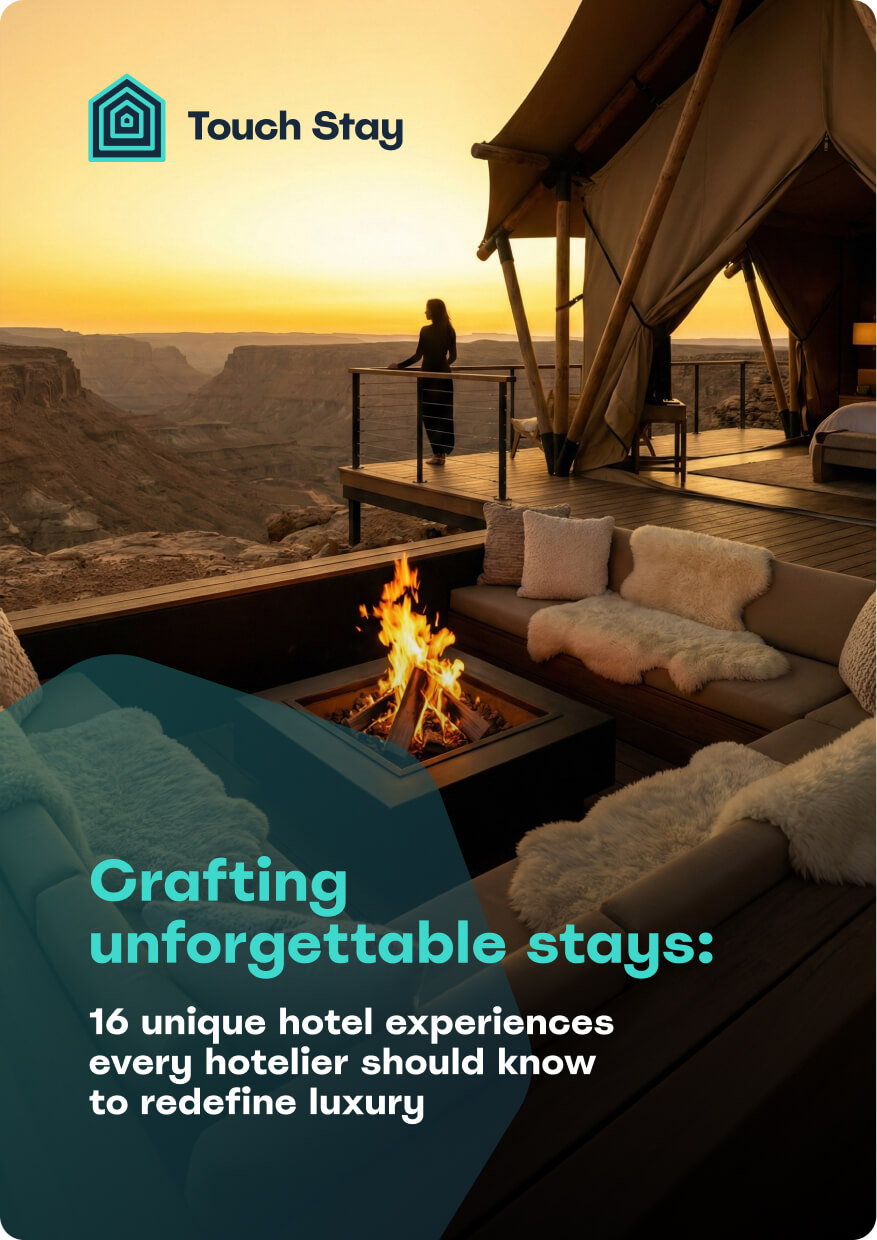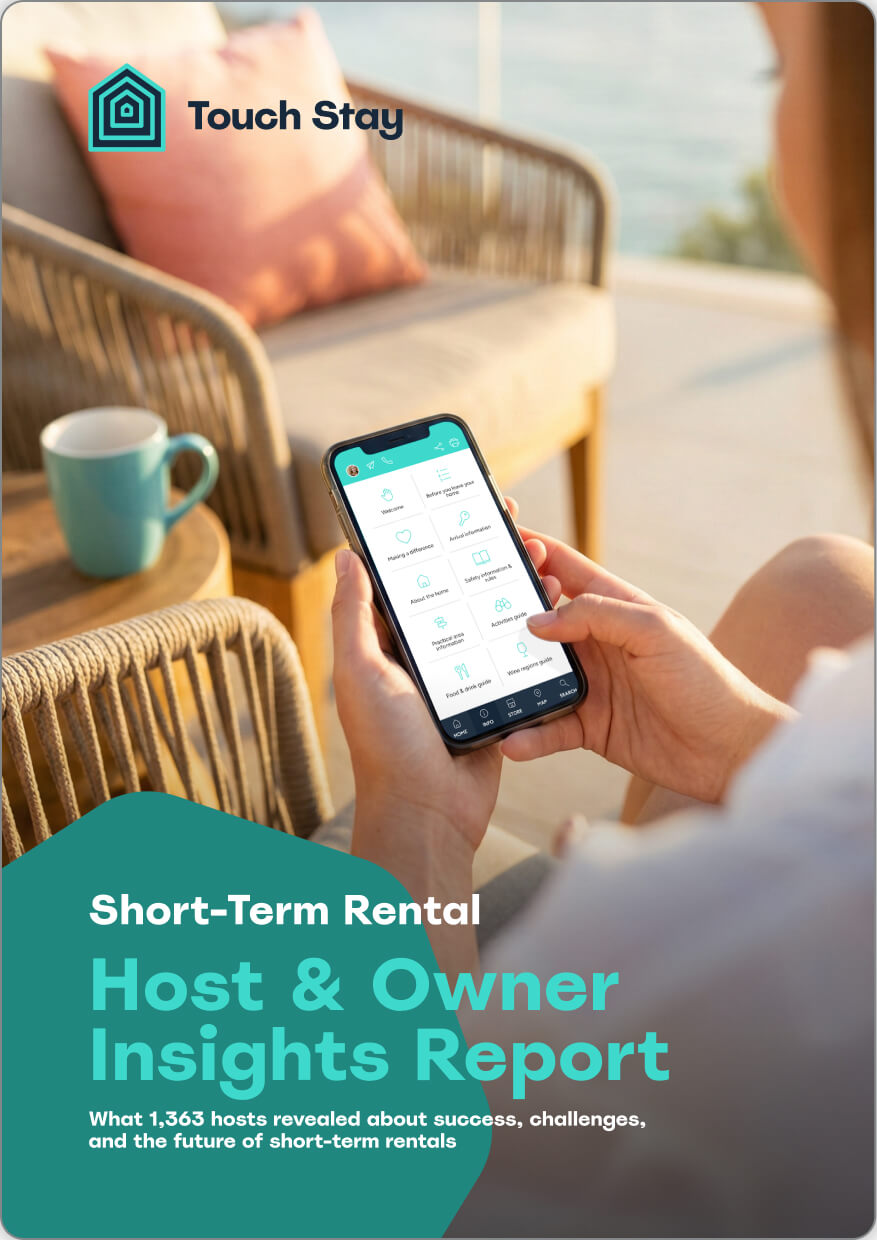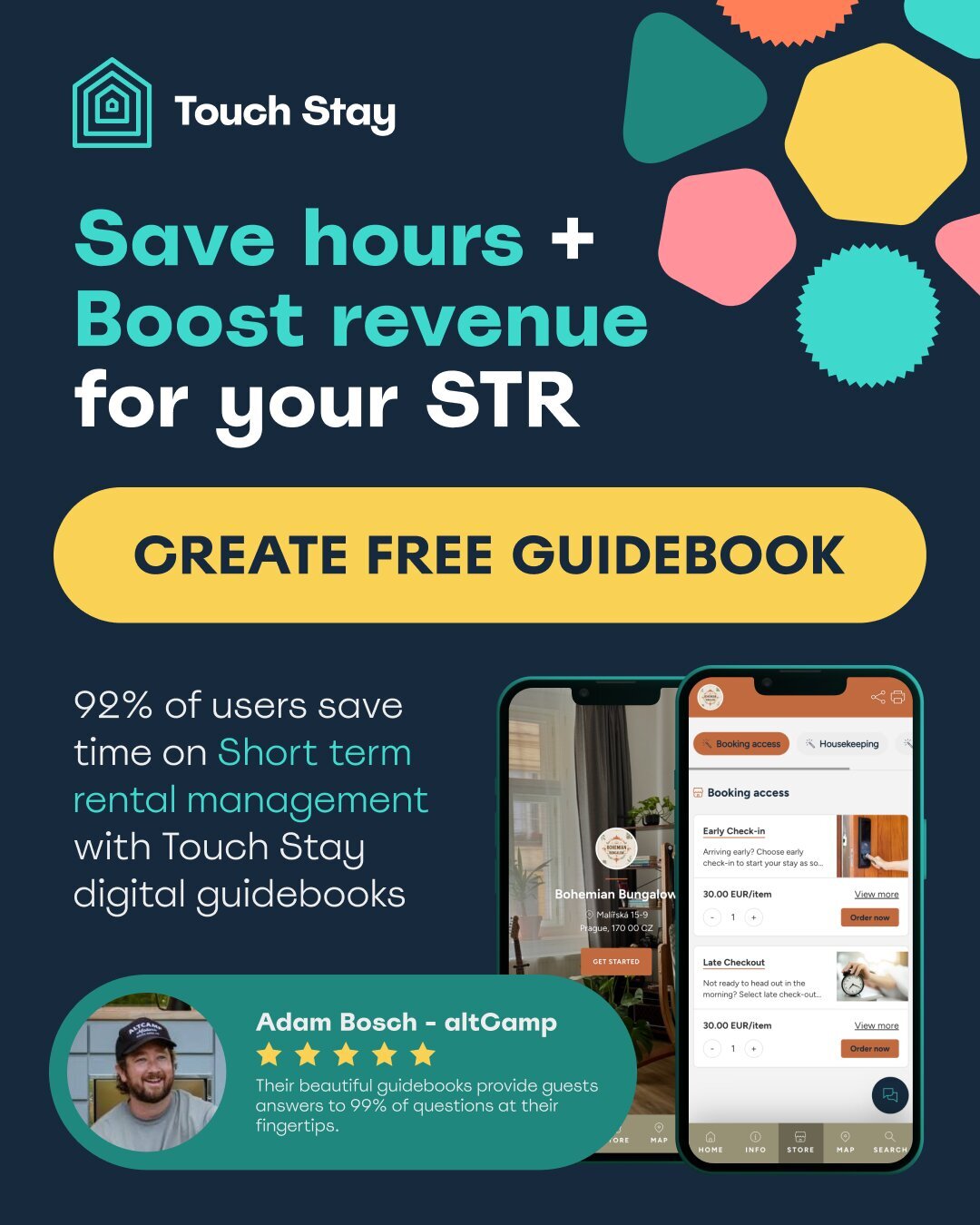In the competitive world of short-term rentals, visibility is key. If your Airbnb listing isn't easily found, you're missing out on potential bookings. This is where Airbnb SEO comes into play. By optimising your listing for Airbnb's search algorithm, you can significantly improve your visibility, attract more guests, and increase your booking rates.
This guide will provide you with a comprehensive overview of Airbnb SEO, covering essential strategies to implement in 2025. We'll explore:
- Understanding Airbnb SEO
- Conducting effective keyword research
- Optimising your Airbnb listing for SEO
- Leveraging competitor analysis
- Enhancing guest engagement for better SEO
- Utilising Airbnb’s built-in features for SEO
- Off-page SEO strategies to boost your Airbnb listing
- Monitoring and adjusting your SEO strategy
- Final thoughts
Enhance your Airbnb SEO efforts easily by leveraging the power of a Touch Stay digital guidebook to improve the guest experience.
Drop your Airbnb link to get started.
Get your custom guest guide in 60 seconds. No card required.
Understanding Airbnb SEO
What is Airbnb SEO?
Airbnb SEO refers to the process of optimising your Airbnb listing to improve its search ranking within the Airbnb platform. It involves a combination of on-page and off-page techniques to make your listing more visible to potential guests searching for accommodation that matches their specific criteria.
Unlike traditional website SEO, which focuses on search engines like Google, Airbnb SEO primarily revolves around optimising your listing for Airbnb's internal search algorithm. This algorithm considers various factors, including the quality of your listing, its popularity among guests, and its price, to determine its search ranking.
Watch close friend of Touch Stay (and industry powerhouse!), Mark Simpson of Boostly, explain how Airbnb SEO differs from traditional search engines:
Benefits of optimising Airbnb listings for SEO include:
- Increased visibility: higher search rankings mean your listing appears more prominently in search results, making it more likely to be seen by potential guests.
- More bookings: increased visibility translates to more enquiries and ultimately, more bookings.
- Higher occupancy rates: by attracting more guests, you can increase your occupancy rates and maximise your earning potential.
- Improved guest experience: a well-optimised listing provides guests with all the necessary information upfront, leading to a smoother booking process and a more positive guest experience.
- Enhanced credibility: a high-ranking listing builds trust and credibility with potential guests, demonstrating that your property is popular and well-regarded.
How Airbnb’s search algorithm works
Airbnb's search algorithm considers numerous factors to match guests with the most suitable listings. Key factors include:
- Quality: high-quality photos, detailed descriptions, and positive guest reviews.
- Popularity: booking history, guest engagement, and social media presence.
- Price: competitive pricing and flexible pricing options.
Airbnb's algorithm aims to match guest searches with the most relevant and suitable listings based on their preferences, budget, and travel dates.
Conducting effective keyword research
Identifying high-impact keywords
Keyword research is fundamental to any SEO strategy. By identifying the keywords that potential guests use to search for accommodation, you can effectively target your listing to the right audience.
- Tools for keyword research: use Airbnb's search bar, Google Keyword Planner, and Mangools to identify relevant keywords.
- Long-tail vs. short-tail keywords:
- Short-tail keywords: broad keywords (e.g., "vacation rentals") attract a large audience but are highly competitive.
- Long-tail keywords: more specific phrases (e.g., "pet-friendly cabin near Lake Tahoe") have lower search volume but are less competitive and more likely to attract highly targeted guests.
- Analysing competitor listings for keyword opportunities: review the titles, descriptions, and amenities of top-performing listings in your area to identify the keywords they are using.
Implementing keywords strategically
Incorporate keywords naturally throughout your listing:
- Title: include 2-3 relevant keywords in your listing title.
- Description: naturally incorporate keywords throughout your description.
- Amenities: list all relevant amenities and use keywords to describe them (e.g., "high-speed Wi-Fi," "fully equipped kitchen").
- Guestbook: respond to guest reviews using relevant keywords.
Pro tip: Avoid keyword stuffing! Focus on creating a natural and engaging description that reads well and provides valuable information to guests.
Optimising your Airbnb listing for SEO
Crafting an SEO-friendly title
Your listing title is the first thing potential guests see, so it's crucial to make it attention-grabbing and keyword-rich.
- Tips for creating attention-grabbing and keyword-rich titles:
- Highlight unique features: emphasise unique selling points, such as "Stunning Ocean Views" or "Private Pool."
- Include location: mention the neighborhood or city to help guests easily find your listing.
- Keep it concise: aim for a concise and impactful title that is easy to read and understand.
- Examples of effective Airbnb listing titles:
- "Luxury Beachfront Condo - Ocean Views & Private Balcony"
- "Charming Studio Apartment in Montmartre - Near Sacre-Coeur"
- "Family-Friendly Cabin - Near Lake & Hiking Trails"
Discover more about how to write the best Airbnb title.
Writing a comprehensive and engaging description
Your listing description is your opportunity to showcase your property and entice potential guests to book.
- Structure descriptions with relevant keywords: use a clear and concise structure, breaking down information into easy-to-read paragraphs.
- Highlight unique selling points and local attractions: emphasise what makes your property special and mention nearby attractions.
- Use storytelling to enhance guest engagement and SEO: use descriptive and emotive language to paint a picture of your property and the surrounding area.
Enhancing visual content
High-quality visuals are essential for attracting attention and showcasing your property's best features.
- Importance of high-quality photos and their impact on SEO: use professional, well-lit photos to showcase different aspects of your property, both interior and exterior.
- Optimise image file names and add alt-text with keywords: use descriptive file names for your images and add alt-text with keywords.
- Use videos and virtual tours to increase engagement: consider creating a short video tour of your property or utilising 360-degree virtual tours.
Leveraging competitor analysis
Analysing competitor listings
By analysing your competitors' listings, you can gain valuable insights into the market and identify areas for improvement in your own listing.
- Identify top competitors in your area: identify properties similar to yours in terms of location, price, and amenities. Analyse their keyword usage, amenities, and pricing strategies.
- Tools for competitor analysis: use Airbnb's search filters, AirDNA, and Mangools to identify and analyse top-rated listings in your area.
Differentiating your listing
Once you've analysed your competitors, it's time to differentiate your listing and make it stand out from the crowd.
- Find gaps in competitors’ offerings: identify what your competitors are missing or not emphasising in their listings.
- Highlight unique features and amenities that set your listing apart: emphasise your property's unique selling points and showcase any special amenities or features that your competitors don't offer.
- Implement strategies to outperform competitors in search rankings: focus on providing a superior guest experience to generate positive reviews. Optimise your listing for relevant keywords to improve your search visibility. Offer competitive pricing and flexible booking options to attract more guests.
Enhancing guest engagement for better SEO
- Fast responses: respond quickly to enquiries to improve your search ranking. Use templates for common questions, but personalise each message.
- Encourage reviews: exceed guest expectations and leave positive reviews for your guests. Gently prompt them to leave reviews after their stay.
- Manage reviews: respond to all reviews professionally. Highlight positive reviews in your listing.
- Digital guidebooks: provide guests with essential information using a Touch Stay digital guidebook.
Utilising Airbnb’s built-in features for SEO
Implementing Instant Book
Instant Book allows guests to book your property instantly without requiring your approval. This feature can improve your search ranking and guest convenience.
- Benefits of enabling Instant Book for SEO and guest convenience: Instant Book can improve your search ranking as Airbnb's algorithm often favors listings that offer instant booking. Guests appreciate the convenience of instant booking, leading to potentially higher booking rates.
- Balancing Instant Book with guest vetting processes: while Instant Book offers advantages, it's essential to balance it with appropriate guest vetting processes. Use Airbnb's guest screening features and set clear house rules to ensure a positive experience for both you and your guests.
- How Instant Book influences search rankings and booking rates: listings with Instant Book enabled often appear higher in search results, increasing visibility and potentially leading to more bookings. Instant booking can also contribute to a higher conversion rate as guests can secure their reservation quickly and easily.
Off-page SEO strategies to boost your Airbnb listing
Building backlinks and external references
While on-page optimisation is crucial, off-page SEO strategies can further enhance your listing's visibility and attract more guests.
- Collaborate with local businesses and tourism websites for backlinks: partner with local businesses, tour operators, and tourism websites to create backlinks to your Airbnb listing. Offer discounts or exclusive experiences to guests who book through these partnerships.
- Promote your listing on social media and relevant forums: create social media profiles for your Airbnb listing and share engaging content that highlights its features and the surrounding area. Participate in relevant online forums and communities to promote your listing and answer questions from potential guests. Consistent engagement can also build forum backlinks, a growing signal for both traditional search engines and AI models that evaluate brand relevance.
- Create shareable content that links back to your Airbnb listing: develop high-quality content (aka link bait content), such as blog posts, videos, or infographics, that showcase your property and the local area. Encourage social sharing and include links back to your Airbnb listing in your content.
Leveraging social media and content marketing
Social media and content marketing can be powerful tools for driving traffic to your Airbnb listing and increasing bookings.
- Use platforms like Instagram, Facebook, and Pinterest to drive traffic: create visually appealing content that showcases your property's best features and the surrounding area. Use relevant hashtags and engage with your followers to increase your reach and visibility.
- Share engaging content that highlights your listing’s features and local area: share blog posts, videos, and photos that highlight your property's unique selling points and the local attractions. Offer travel tips and recommendations to provide value to your followers and potential guests.
- Encourage guests to share their experiences on social media: encourage guests to share their experiences on social media by providing them with a unique hashtag or social media handle. Offer incentives, such as discounts or freebies, to guests who share their stay on social media.
For essential social media tips and advice, check out our 15 inspirational short-term rental influencers.
Monitoring and adjusting your SEO strategy
Tracking SEO performance metrics
Monitoring your Airbnb SEO performance is crucial to identify what's working and what needs improvement.
- Key metrics to monitor
- Impressions: track how many times your listing appears in search results.
- Clicks: monitor how many times guests click on your listing in search results.
- Bookings: track your booking conversion rate to see how many clicks result in actual bookings.
- Guest engagement: monitor your response rate and review ratings to assess guest satisfaction.
- Tools for tracking and analysing SEO performance:
- Airbnb Insights: this built-in tool provides data on your listing's performance, including views, bookings, and revenue.
- Google Analytics: use this tool to track website traffic and referral sources to your Airbnb listing.
Refining your SEO tactics based on data
Regularly analyse your SEO performance data to identify areas for improvement and refine your tactics.
- Interpret data to identify successful strategies and areas for improvement: analyse your data to identify which keywords and SEO strategies are driving the most traffic and bookings. Identify any areas of weakness in your listing and implement strategies to address them.
- A/B test different listing elements to optimise performance: experiment with different listing titles, descriptions, and photos to see what resonates most with guests. Track the performance of each variation to determine the most effective elements.
- Stay updated with Airbnb’s algorithm changes and adapt accordingly: stay informed about any changes to Airbnb's search algorithm and adjust your SEO strategies accordingly. Monitor industry trends and best practices to ensure your listing remains competitive.
Final thoughts
By implementing the strategies outlined in this guide, you can significantly improve your Airbnb SEO and attract more guests to your property. Remember that Airbnb SEO is an ongoing process, and it's essential to continuously monitor your performance and make adjustments as needed.
By following these tips and staying informed about the latest Airbnb SEO best practices, you can increase your visibility, attract more bookings, and achieve sustained success as an Airbnb host.
Ready to take your Airbnb hosting to the next level? Sign up for a 14-day free trial of Touch Stay's digital guidebooks today and streamline your guest communication while enhancing the guest experience.

Ned
Ned has clocked up over 11 years in digital marketing and comms, with a strong focus on creating engaging content for a range of brands and agencies. When he’s not writing, he can be found digging for records, peering through his telescope at the night sky, or onboard his local lifeboat where he volunteers as a crewmember.
Be the first to know!
Join our newsletter for early access to:
- ✅ Free guides
- ✅ Pro tips & tricks
- ✅ Time saving tutorials
- ✅ Latest blog posts
- ✅ Checklists & templates






















